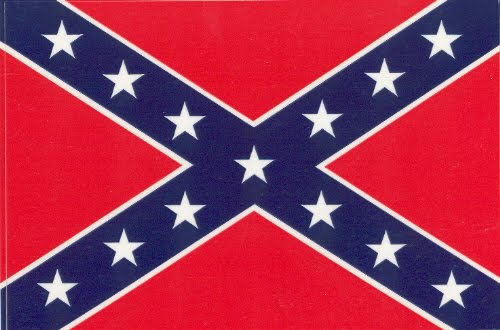Basic beliefs acknowledge that the Confederacy is wrong, that it was against human rights and equality for blacks in America. We've been taught this and learned how black people felt during this time. What about the Confederate women? They were not allowed to vote for or against the war. How did they feel during this time period? What impact did the war have on their lives?
In his book, Foner writes that "Even more than in the North, the war placed unprecedented burdens on southern white women." (510) He goes on to write that because they were "Left alone on farms and plantations, they were often forced to manage business affairs and discipline slaves, previously the responsibility of men." (510) In addition to taking on the additional work that they were not used to, white women had to worry about the safety of their husbands at war.
To help support the men at war, the women took to making Confederate flags. They would they present the flags to troops. In an address by Mrs. Spotswood to the Red River Dragons she states "The great chaos in which our country has been thrown, caused by the revolting actions of those hungry and mercenary squads of the North, is the most eventful epoch of the nineteenth century. For twenty-five years these bickerings have been going on, headed by these maddened fanatics, who have planned rebellion, without justification, and are now restrained by fears or scruples, from taking any decisive step. These advancements being urged on by their Black Republican President, and other avaricious traitors, have brought about the revolution which now threatens us. This aggression has been the means of severing the tie that once bound our glorious and happy Union. Eleven States have already withdrawn from that oppressive Government, and quietly formed a Southern Confederacy—only asking the privilege to breathe their own air, manage their own affairs, support their own altars, and resolve "to do or die." We have reserved a space upon the blue field in this flag for others, which we hope, ere many [illegible] in the western horizon, will [illegible] "that proud old Com- [illegible] the mother of our country." [Illegible] united hand, cemented by justice, by affection, and armed in defence of your lives, your homes, and your interests, [illegible] an impulse deeper far than the mere love of money, urge you outward and onward in the support of those rights, and let your motto be "Liberty or Death." In our dear "sunny South," the smiling sky, the balmy breeze that fans the weary traveller's cheek—the beautiful streams, in which are blended all the hues of the rainbow, speak of mercy and liberty—such scenes of radiant nature transport the imagination with a holy enthusiasm. "Land of the South—beneath the Heaven. There's not a fairer, lovelier clime, Nor one to which was ever given a destiny more high, sublime." If our social and commercial ties were permitted to be torn asunder by Black Republicanism and federal aggression, what would be our lot? Our religious altars would be hurled to the ground; infidel desecrations would rise in their stead, and our glorious South become a desert—a place for rabbles, or the halls of revelry for our oppressors. Gentlemen, in expressing the entire approbation and heartfelt emotions of those, whom I have the honor to represent; I tender to you this flag—emblematical of our Southern Confederacy, and as a token of their confidence in your valor; believing you merit the warmest eulogies. Accept it, not only as a realization of woman's patriotism, but the religion of her love and prayers." http://www.uttyler.edu/vbetts/texas_women_public_voices.htm
This statement by Mrs. Spotswood goes to show the view of Confereate women during the Civil War. We know the view of the North very well because they were fighting for justice. Her statement goes to show how the other side felt during that time. Confederacy was their way of life upon loosing the battle their lives would be forever changed.
Resources
"Address of Mrs. Spotswood", http://www.uttyler.edu/vbetts/texas_women_public_voices.htm
Foner, Eric. Give Me Liberty Volume 1, Second Edition. New York. W.W. Norton & Company. 2009


